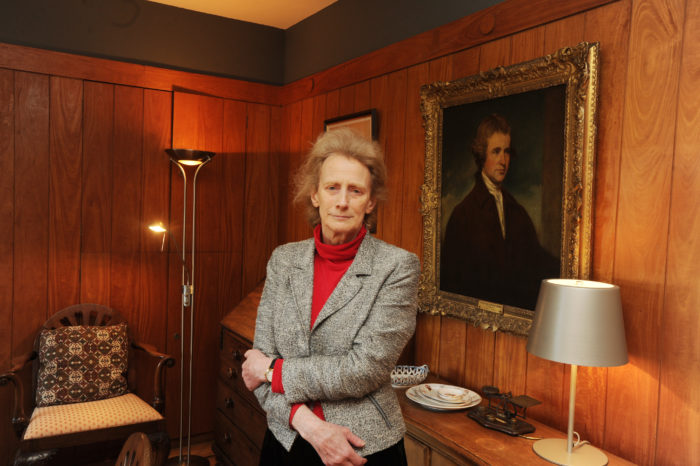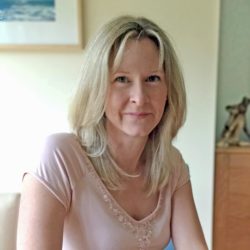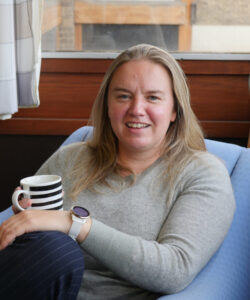Since 1972 women have formed a core and essential part of our community, being heavily represented in the College students’ unions, in sport, music, drama, art and many other areas of extra-curricular activity, all while achieving outstanding academic results. There is a strong female presence on the College’s Fellowship, and many of its academics most focused upon working closely with students (Directors of Studies, for instance) are women.
The current Master, Professor Dame Athene Donald, is the first woman to hold this role in the College, and during her tenure the proportion of women students in the College achieved parity with men.
We’re reflecting on how far Churchill College has come and what it means for and to women who have been part of Churchill College since that time, right through to today. Below you can find perspectives, achievements and memories from students, staff and Fellows, past and present.
Events and stories
Talks, Exhibitions & Recordings
Churchill Archives Online Exhibition: 50 Years of Women at Churchill
Student profiles celebrating International Women & Girls in Science Day
Student Spotlight: Irene Jackson Sillah
Student Spotlight: Tharushi Wijesena
Stories & Talks
Across the year we featured stories, interviews and content from those who have been involved with Churchill College, past and present, as we celebrated successes, shared reflections and look forward to the future.
Featured stories
Leadership at Churchill College
Churchill College is unusual among Cambridge Colleges in that it currently has a female Master, Bursar and Senior Tutor.
Athene Donald: The first female Master of Churchill College
Tamsin James: Current Bursar of Churchill College
Rita Monson: The first female Senior Tutor of Churchill College
Meet some of our current students
Student Spotlight: Imane Iraoui
Student Spotlight: Inioluwa Afolabi
Student Spotlight: Hannah Saint
Women at Churchill in the News
Athene Donald – the First Woman Master of Churchill College
This article was published in the Churchill Review, Vol 59. Professor Dame Athene Donald is a physicist
and the Master of Churchill College.
I’ve been asked to comment on what it’s felt like to be the first female Master of Churchill for this Review in the 50th year since women were first admitted to the College. In brief, everyone – Fellows, students, staff and alumni – have been entirely welcoming and in no sense have I felt my gender got in the way of good relations or prevented my voice being heard and taken seriously. Maybe senior women elsewhere in Cambridge Colleges would not say the same.
Interview process and election
Other, older colleges had approached me prior to the letter inviting me to apply to be Master of Churchill, but Churchill appealed in a way the others had not. Its focus on science and technology has always made it special within the Cambridge system, and it made it especially attractive to me as a physicist. The interview process itself was pretty gruelling, stretching over two days. Some of that may have been meant to be informal, but I felt sure everything I said would be scrutinised, even apparently light dinner conversation. When I heard I’d been elected, impostor syndrome came to the fore, and I wondered how I’d be able to fulfil all the different strands of the role effectively. It took quite a long time for the formal approval to come from No 10 (the Mastership is a so-called Regius appointment), during which I had opportunities to talk about the nature of the role in more detail with key people in the College. Perhaps one of the few issues that arose at that point about being a woman was the question of title. Ken Siddle asked me my views about being called ‘Master’, but it wasn’t (and isn’t) something I feel very strongly about, and so the title stood.
Some curiosity about me
Matthew and I were able to move into the Lodge at the start of September 2014, after it had been completely refurbished, which gave us a month to get to know the College before term started and I formally took over: a real advantage. As I got to meet the Fellowship, I may have felt there was a little curiosity about me, but at no point did I feel there was any negativity around me being the first female Master. I feel sure that any new Master is ‘inspected’ with curiosity. Everyone made me feel very welcome.
Towards a more diverse Fellowship
Having said that, those first weeks and months feel something of a blur. So much information to take in, so many people to meet and remember. Perhaps if the gender balance in the Fellowship had been closer to parity, I’d have found it a little easier to distinguish some of them. Who knows? Moving towards a more diverse Fellowship I think is a shift that broadly is supported, but it isn’t that easy and will take a long time – even to get to a 50:50 gender split, let alone electing more people of different ethnicities.
I well remember one Fellow saying, early on over lunch, that the issues over a lack of women in the College, specifically in Mathematics, would be solved with a female head. I pointed out that I didn’t feel that would at all solve the problem, as indeed has proved to be the case. Nevertheless, having noted at the 2015 Matriculation Dinner just how few female Freshers there were (28% that year, I recall) and remarking on this to the Senior Tutor, he immediately took it upon himself and the Admissions team to work on the problem and there is now much more of a focus on this issue during the Admissions process. Having reached essentially gender parity in 2020, I was very glad to see that figure held up in 2021 too. There is, as I have said regarding the Fellowship, much more work to be done about broader issues around inclusion.
Women’s voices
This College has always made both Matthew and myself feel welcome. I have never felt my words weren’t listened to as a woman, or that I was viewed with suspicion because of my gender. However, where I have really noticed a change around women at the top has been outside this College within the wider University. When I started as Master, about 1/3 of the other Heads of House were women. Several of us amongst that group definitely felt women were seen as outsiders and their voices weren’t heard equally. But now, when that proportion has risen to essentially equal numbers of men and women, the sense I get when we are all gathered together is that things have really moved on. Everyone does seem to be treated equally and there is no sense that women’s voices are less listened to. It’s there that I notice the real difference since I started in this role. The College has always been great, as I’m sure it will continue to be.

Introducing Tamsin James, Bursar
A version of this article was published in the Churchill Review, Vol 58.
Working at Churchill as only the fifth Bursar in its history is both an honour and a privilege, but I am not the first female Bursar, by nearly two decades and I think that says a great deal about the College.
Churchill was actually my first view of the University of Cambridge. Growing up in St Neots, it seemed a million miles away. I little thought, as an eager student (and I was, and still am, rather a swot), commuting daily on the bus down Madingley Road to attend Hills Road Sixth Form, that I might one day work here, let alone take on such a significant mantle.
I feel a tremendous sense of responsibility to build on the College’s strong history and make a significant contribution to an even stronger future. Starting in the middle of Lent Term back in 2017 reminded me very quickly how intense Cambridge terms are. I was previously somewhat removed from that experience, with roles at the Institute of Continuing Education at Madingley Hall and before that in the NHS, where one regularly bemoaned the relentless fifty-two week cycle and thought rather longingly of terms. I think the reality is that only with constantly seeking improved approaches to tackling growing pressures can we carve out the necessary time for strategic thinking and planning, regardless of the cycles within which we work.
I have a wonderful team to work with and enjoy this challenging and rewarding role. I hope people will continue to share with me their ideas and concerns so that I can do my very best to support and guide the College over the coming years.

Rita Monson – The First Female Senior Tutor of Churchill College
This article was published in the Churchill Review, Vol 59. Although Dr Sally Boss and Dr Lisa Jardine Wright have been Acting Senior Tutors, Dr Rita Monson is Churchill College’s first permanent woman Senior Tutor.
It is with incredible excitement that I embarked as Churchill’s first woman Senior Tutor from October 1, 2021. Taking up this position has been made significantly easier given my familiarity with the Fellowship, as a Teaching By-Fellow from 2007-2011 and a Title A Fellow from 2011 till the present. Despite my longevity with the College, it was not until I was informed by Professor Mark Goldie, in his capacity as unofficial College Historian, that I realised that I was the College’s first permanent woman Senior Tutor. While this is now obvious to me, I should say that I do not think that my being the first Female Senior Tutor has changed anything about the way that I do the job or that anyone within the College interacts with me!
My Canadian accent sets me apart
Perhaps one of the reasons that it does not feel like such a large advancement in the College to have a woman Senior Tutor is because it is at a time when both our Master and Bursar are women. While I am sure that being a woman changes the way that I am regarded, I tend to hope that, in many ways, it makes it easier for me to do the job. Perhaps strangely, I often feel that my obvious North American accent is the thing that really sets me apart. As many of you will appreciate, being the Senior Tutor often requires very delicate conversations with students, who rarely arrive in your office on their best days. Instead, these conversations are often marked by sadness, ill health and distress. In such cases, a caring and more informal approach helps to engage students and also to put them at ease. In these situations, I have found that my pragmatic Canadian approach, where I am constantly solution focused has served me well.
My priorities
Members will likely want to know what I plan to change or about my priorities moving forward. I remain firmly committed to the College’s focus on widening participation and outreach in our target areas. I would note that the College’s intake in October 2021 was one of gender parity. This is a notable change since I arrived as a Fellow. I remember distinctly an Open day where the Directors of Studies in the Natural Sciences – myself (Biology), Lisa Jardine-Wright (Physics) and Katherine Stott (Chemistry) were asked by a student if there were any men in the College. I cannot remember if the question was facetious or not, but I am struck by how my answer to this question today would be very different. The incoming cohort of students this year (2022) will again be one that has rough gender parity.
Changes in our Fellowship community
It has also been a pleasure this year to be a part of some large changes in our Fellowship Community that we hope will change the appreciation of Churchill College. In particular, I am excited to share news of a change in our Engineering fellowship. This year we appointed our first Community, Outreach and Recruitment in Engineering (CORE) Fellow, Dr Rachel Thorley who arrives with us from Sheffield University on August 1st. This position has been made possible through the generous donation of Greg and Rosie Lock and we are excited to welcome Rachel.
Strong academic performance
I remain focused on academic achievement within our student body. A particular area of interest to our community may be the extremely strong performance of our home female students. They have been extremely solid and last academic year had the highest % of awarded 1st class degrees in history – at 66.7% against a backdrop of 41% 1st class degrees to women across the whole University. However, I know and understand that achievement in examinations is often not enough for employers and for many students, practical experience has been difficult to procure during the pandemic.
Practical experience – a must
Experience, such as summer lab placements, work in archives or internships remain extremely important. To help facilitate more opportunities within our student body, the Development Office were extremely helpful in establishing a Summer Opportunities Bursary Fund through the College’s Giving Day. It will remain my focus to continue striving to make sure that all of our students have these types of opportunities moving forward and are able to launch themselves into their lives beyond Churchill in the strongest possible position.
And finally
I have been reflecting a lot on the past year. I am indebted to the support and encouragement I had in application and in post from Liz DeMarrais (who is sadly leaving us as Postgraduate Senior Tutor), Alex Webb (without whose encouragement I might never have considered this as an option), Adrian Barbrook (my co-Director of Studies in Biology and soon to be Vice-Master) and Barry Phipps (curator of Art and fellow food truck connoisseur) to pick out a few. Along with an incredible set of Tutorial Staff, Tutors and Directors of Studies, they have been an incredible support structure throughout the year. I am indebted to their encouragement through this transition. Though I might be the first woman Senior Tutor Churchill has appointed permanently, it goes without saying that both Sally, and later Lisa, paved the way for me and, it is a testament to both of their tenures, that my status as ‘first woman’ ST has almost never been noted! It has been a wonderful and challenging year and I look forward to the challenges ahead.

